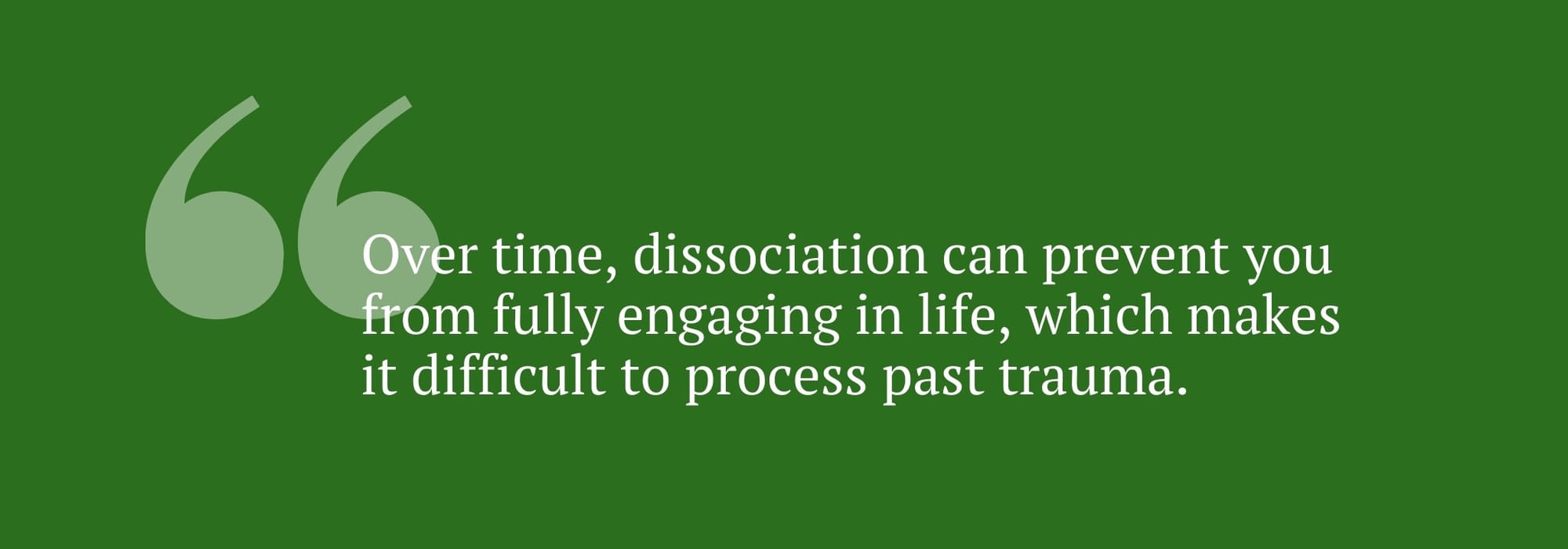The feeling of ‘dissociating’ can be distressing, so how can you pull yourself back to reality?
Most of us will be familiar with the sensation of ‘zoning out’ occasionally – but this can go deeper. Have you ever experienced emotional numbness, and felt like you’re watching yourself in a movie? Struggled to remember large chunks of time, or even recognise your own reflection? From mild to severe, these are all signs of dissociation.
What is dissociation, and what triggers it?
Dissociation is a psychological detachment from yourself or your surroundings, often in response to stressful or traumatic situations. A dissociative episode can range from a few minutes or hours of feeling ‘spaced out’ and unable to focus, to days or even months of memory blackouts, not recognising familiar faces and places, and feeling that life isn’t ‘real’.
We’re most likely to experience dissociation in physically or emotionally troubling situations, explains person-centred counsellor Georgina Gardner Stockley: “It’s a way in which our bodies and minds protect us from becoming overwhelmed by unpleasant, intense, or frightening experiences. Broadly, dissociation will be triggered by something which is perceived as a threat.”
But that doesn’t always mean in the immediate circumstance. “[The threat] could be a smell, emotion, sound, or situation that reminds us of something that previously hurt us,” she adds.
It’s important to remember that dissociation is a natural coping mechanism, but it can be problematic if it interferes with daily life, or causes us distress. In many cases, the mind will come out of a dissociative state when it perceives the threat to have passed.
If you feel yourself dissociating, Georgina and clinical psychologist Dr Aisha Tariq recommend these practical ways to get back in control, and to recognise when you need professional help.
Engage your senses to reconnect
When symptoms are mild, Dr Tariq recommends some simple grounding techniques: “Engaging your senses is one of the most effective ways to reconnect with reality. Touch an object with a distinct texture, listen closely to the sounds around you, or focus on what’s happening in your environment. These actions help move you from dissociation into awareness.
“Movement is another grounding tool. Whether it’s standing, stretching, or walking, any small movement can remind you that you’re present in your body and surroundings,” adds Dr Tariq.
Seek comfort through others
If the mind dissociates in a frightening, seemingly ‘unsafe’ situation, it follows that things you associate with ‘safety’ will bring you back. “Experience connection with another human or an animal,” Georgina says. “Stroking a pet works on multiple levels as it provides fodder for your senses through texture – and, depending on your animal, it may also provide scent – as well as a sense of love and bonding.”
Or give yourself a hug. “Some people find comfort in being made more aware of the boundary of their body, so wrapping yourself in a blanket may be soothing,” she suggests.

Seek support to help make a plan
Georgina reassures that being in a dissociated state is rarely a crisis, but acknowledges, “it’s innately disconcerting to have memory gaps, therefore, many people are fearful of their dissociation.
“If you’re worried that you might hurt yourself, or others, while dissociated, speak to a therapist. They can help you identify triggers, learn regulation techniques, and create a plan as to how to protect yourself in future episodes.”
If you suffer from mild but persistent dissociation and don’t address it, it can take its toll, warns Dr Tariq. “Over time, dissociation can prevent you from fully engaging in life, which makes it difficult to process past trauma. Emotional pain and stress may resurface in other ways, such as anxiety or depression.” She adds that during severe episodes where you fear there is a considerable risk of harm, the emergency services should be contacted immediately.
Recognise ‘healthy’ vs ‘unhealthy’ dissociation
Dissociation isn’t necessarily always a bad thing. Knowing the signs of healthy dissociation can help you embrace the positives, and stop you spiralling into an unhealthy state.
“Experiencing a ‘flow state’ can be a positive form of dissociation,” explains Dr Tariq. “When you’re completely immersed in an activity, and lose track of time, it can boost creativity and performance. Daydreaming is another type of dissociation that can be harmless, and even helpful, when done in moderation. It provides a mental break from the stresses of everyday life, and allows your mind to recharge.
“However, the key difference between healthy and unhealthy dissociation is whether it interferes with your ability to function or engage with your emotions.” So, if your dissociation is a way of avoiding difficult feelings, know that it’s time to talk to a professional.


Comments